
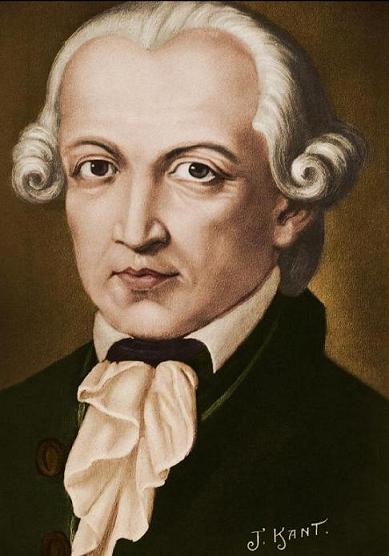
Immanuel Kant (17241804).
KANT

Roger Scruton

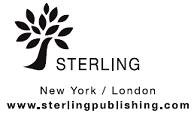
STERLING and the distinctive Sterling logo are registered trademarks of
Sterling Publishing Co., Inc.
Library of Congress Cataloging-in-Publication Data
Scruton, Roger.
Kant : a brief insight / Roger Scruton. -- Illustrated ed.
p. cm.
ISBN 978-1-4027-7901-5
1. Kant, Immanuel, 1724-1804. I. Title
B2798.S37 2010
193--dc22
2010013457
10 9 8 7 6 5 4 3 2 1
Published by Sterling Publishing Co., Inc.
387 Park Avenue South, New York, NY 10016
Published by arrangement with Oxford University Press, Inc.
1982, 2001 by Roger Scruton
Illustrated edition published in 2010 by Sterling Publishing Co., Inc.
Additional text 2010 Sterling Publishing Co., Inc.
Distributed in Canada by Sterling Publishing
 Canadian Manda Group, 165 Dufferin Street
Canadian Manda Group, 165 Dufferin Street
Toronto, Ontario, Canada M6K 3H6
Book design: The DesignWorks Group
Please see for image copyright information.
Printed in China
All rights reserved
Sterling ISBN 978-1-4027-7901-5
For information about custom editions, special sales, premium and
corporate purchases, please contact Sterling Special Sales
Department at 800-805-5489 or specialsales@sterlingpublishing.com.
PREFACE TO THE
REVISED EDITION

IN REVISING THIS INTRODUCTION I have tried to take account of recent scholarship, and to offer a more reliable guide to both primary and secondary sources. I have also amended the text where it seemed to me to be inaccurate or misleading, and added a chapter on Kants political philosophya subject that has attracted increasing attention in the twenty years since this book first appeared. The interpretation of Kant that I offer is by no means the only one, and I have had to take sides in controversies that are of ever-increasing intricacy. In the guide to Further Reading I indicate books that will help to rectify the inevitable one-sidedness of an introduction.
Malmesbury
JANUARY 2001
PREFACE TO THE
FIRST EDITION

I HAVE TRIED TO PRESENT Kants thought in a modern idiom, while presupposing the least possible knowledge of philosophy. Since Kant is one of the most difficult of modern philosophers, I cannot hope that I have made every aspect of this thought intelligible to the general reader. It is not clear that every aspect of his thought has been intelligible to anyone, even to Kant. The depth and complexity of Kants philosophy are such that it is only after complete immersion that the importance of its questions, and the imaginative power of its answers, can be understood. Kant hoped to draw the limits of the human understanding; he found himself compelled to transcend them. Readers should therefore not be surprised if they have to read this introduction more than once in order to appreciate Kants vision. To share that vision is to see the world transformed; to acquire it cannot be the labor of a single day.
The first draft of this book was written in Prague. I am grateful to Dr. Ladislav Hejdnek, not only for the invitation to speak to his seminar on the topic of the categorical imperative, but also for the example he has set in obeying it. I have benefited from Ruby Meager, Mark Platts, and Dorothy Edgington, who commented on a later draft, and from the students of London University who have, over the last decade, made the teaching of Kants philosophy so rewarding. I have also benefited, in more ways than I can express, from the kindness of Lenka  , to whom this book is dedicated.
, to whom this book is dedicated.
London
MAY 1981
CONTENTS

ABBREVIATIONS

QUOTATIONS ARE MOSTLY FROM the English translations referred to in the Further Reading. However, where these translations have seemed to me to be misleading or inelegant, I have used my own.
A. Critique of Pure Reason, first edition
B. Critique of Pure Reason, second edition
P. Critique of Practical Reason
J. Critique of Aesthetic Judgement
T. Critique of Teleological Judgement
G. Groundwork of the Metaphysic of Morals
F. Prolegomena to any Future Metaphysics
M. The Metaphysics of Morals
Page references to those works are to the standard German edition, or else, in the case of the Critique of Pure Reason, to the original pagination of the first and second editions. For English translations, see Further Reading.
I have also occasionally referred to the following:
I. Inaugural Dissertation, contained in G. B. Kerferd, D. K. E. Walford, and P. G. Lucas (eds.), Kant: SelectedPre-Critical Writings (Manchester, 1968)
K. The KantEberhard Controversy, by H. E. Allison (Baltimore and London, 1973)
L. Lectures on Ethics, tr. L. Infield, new edition (New York, 1963)
C. Kants Philosophical Correspondence: 175999, ed. and tr. Arnulf Zweig (Chicago, 1967)
R. Hans Reiss (ed.), Kant: Political Writings, tr. H. B. Nisbet (Cambridge, 1970). This contains three works that I refer to: An Answer to the Question: What Is Enlightenment? (What Is Enlightenment?, for short); On the CommonSaying: This may be true in theory, but it does not apply inpractice (Common Saying, for short), and Perpetual Peace:A Philosophical Sketch (PP for short).
All italics that appear in quotations from Kant are his own.
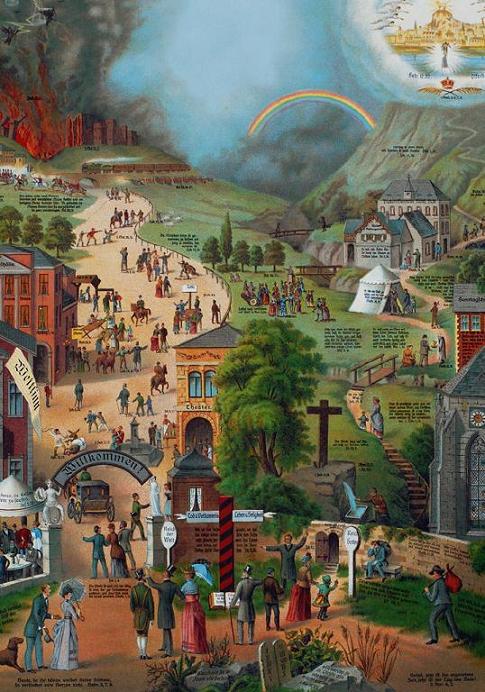
Kants early life and education, as well as his later moral thinking, were shaped by the German pietism movement, which stressed work, duty, and prayer. The Broad and Narrow Road, an illustration depicting the principles of the pietist movement, draws on Matthew 7:1314: Enter through the narrow gate. For wide is the gate and broad is the road that leads to destruction, and many enter through it. But small is the gate and narrow the road that leads to life, and only a few find it.
ONE
Life, Works, and Character

THE GREATEST MODERN PHI LOSOPHER was moved by nothing more than by duty. His life, in consequence, was unremarkable. For Kant, the virtuous man is so much the master of his passions as scarcely to be prompted by them, and so far indifferent to power and reputation as to regard their significance as nothing beside that of duty itself. Having confined his life so that he could act without strain according to this ideal, Kant devoted himself to scholarship, entirely governed by congenial routines. The little professor of Knigsberg has thus become the type of the modern philosopher: bounded in a nutshell, and counting himself king of infinite space.
Next page
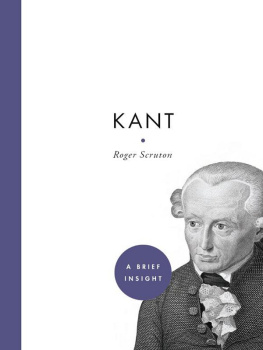
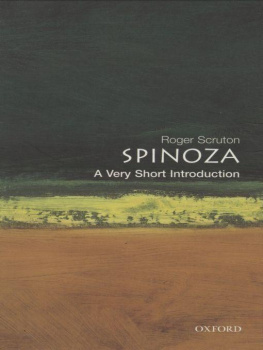
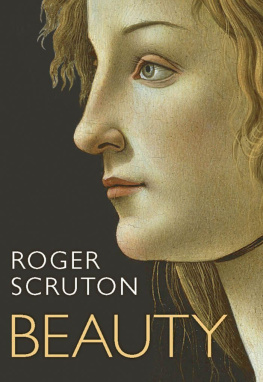
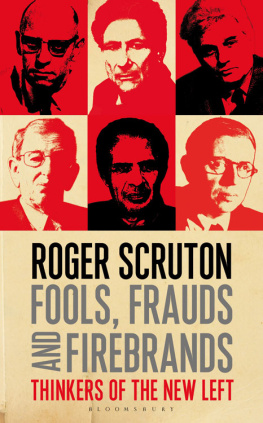
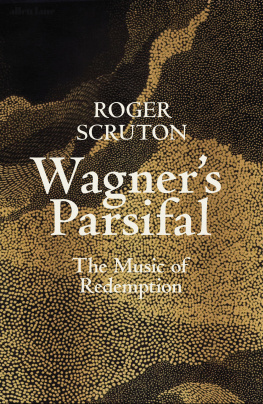
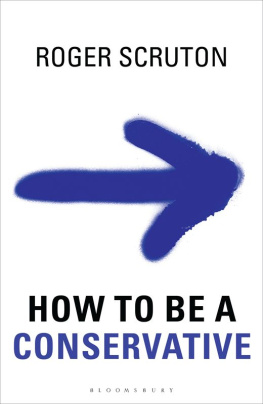
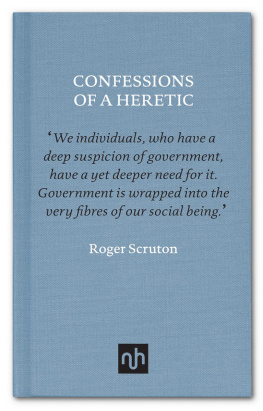
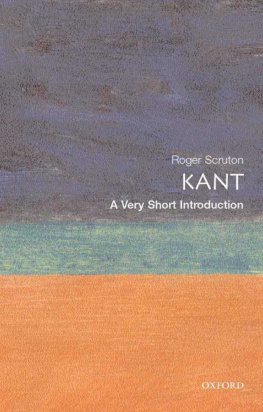
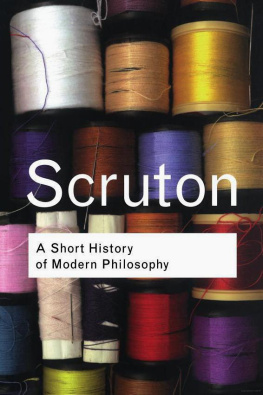
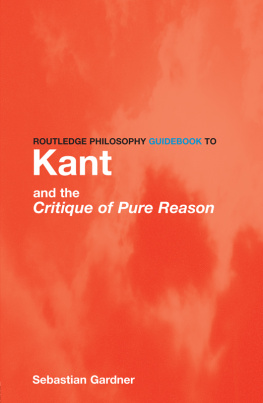
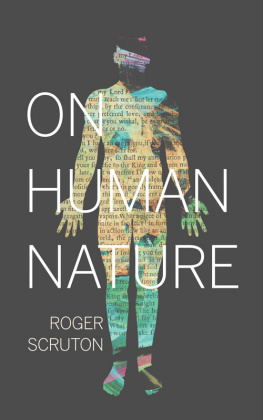
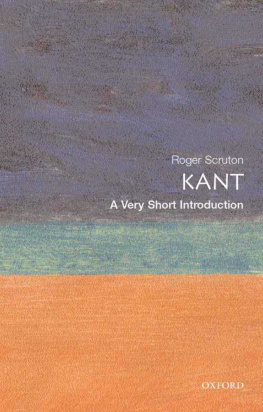
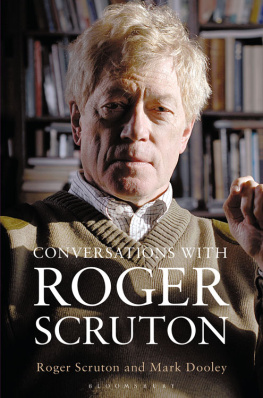
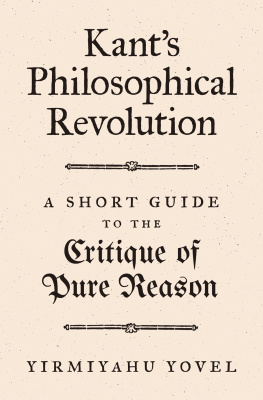
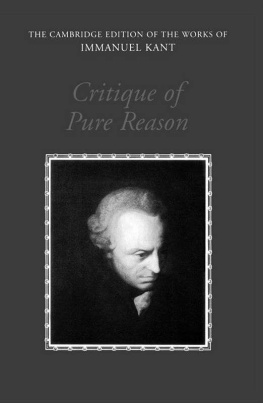








 Canadian Manda Group, 165 Dufferin Street
Canadian Manda Group, 165 Dufferin Street

 , to whom this book is dedicated.
, to whom this book is dedicated.


